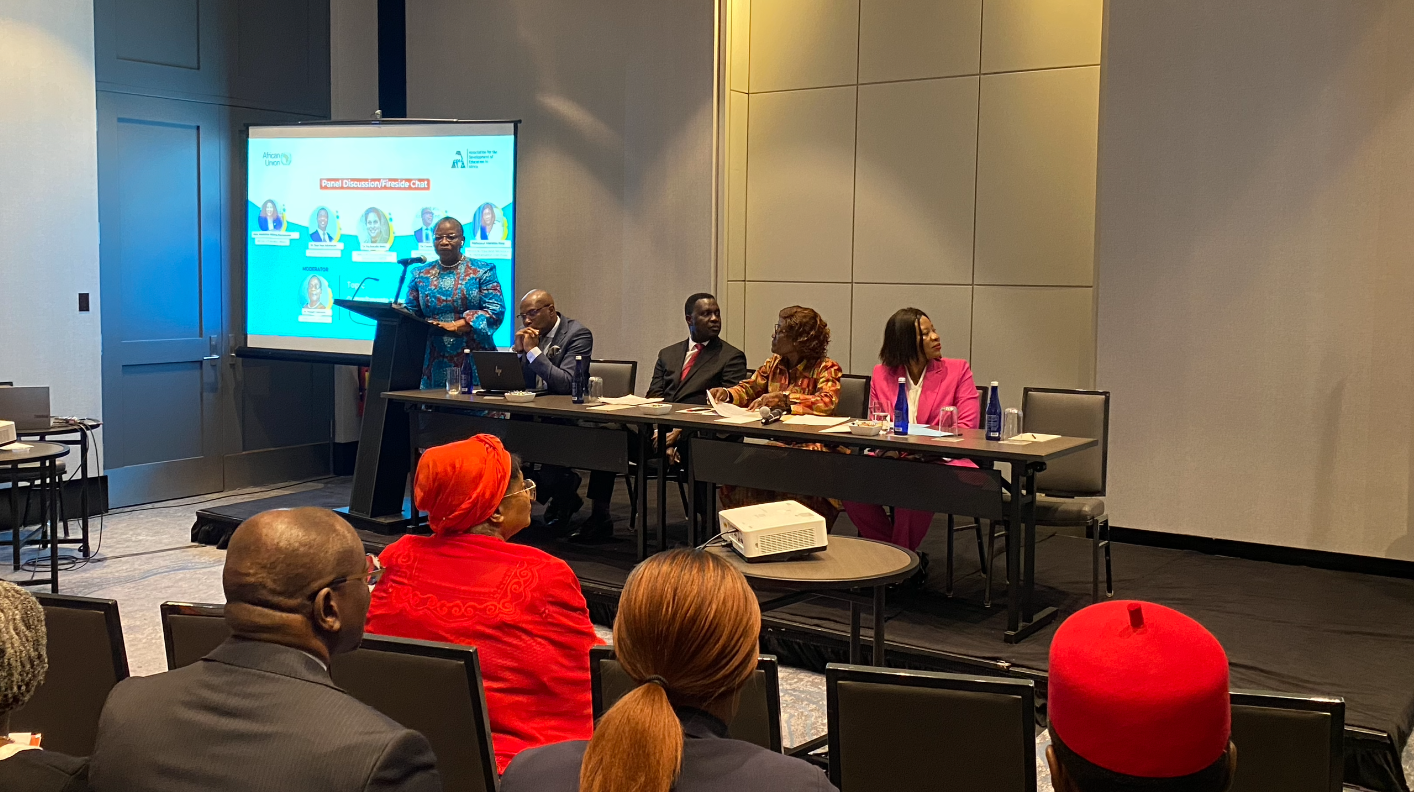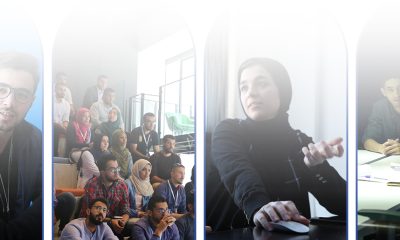Africa speaks
Unimaginable horror faced by African migrants – UN Report

Migrants in Libya: Migrated into slavery and suffering
Migrants and refugees are being subjected to “unimaginable horrors” from the moment they enter Libya and throughout their stay in that country, a UN report has stated.
The report, released by the United Nations Political Mission in Libya (UNSMIL) and the UN Human Rights Office (OHCHR), also showed the horrors of attempting to cross the Mediterranean.
The findings were based on 1,300 first-hand accounts gathered by UN human rights staff in Libya itself as well as from migrants who had returned to Nigeria.
It also featured accounts of Nigerians who managed to reach Italy, tracing the entire journey of migrants and refugees from Libya’s southern border across the desert to the northern coast.
“There is a local and international failure to handle this hidden human calamity that continues to take place in Libya,” said Ghassan Salamé, head of UNSMIL.
From unlawful killings, arbitrary detention and torture, to gang rape, slavery, and human trafficking, the report covers a 20-month period up to August 2018.
It detailed a terrible litany of violations and abuses committed by a range of state officials, armed groups, smugglers and traffickers against migrants and refugees.
The climate of lawlessness in Libya provides fertile ground for illicit activities, leaving migrants and refugees “at the mercy of countless predators who view them as commodities to be exploited and extorted,” the report said.
It noted that “the overwhelming majority of women and older teenage girls” report having been “gang raped by smugglers or traffickers.”
Many people were sold from one criminal group to another and held in unofficial and illegal centres run directly by armed groups or criminal gangs.
The report said: “Countless migrants and refugees lost their lives during captivity by smugglers after being shot, tortured to death or simply left to die from starvation or medical neglect.

“Across Libya, unidentified bodies of migrants and refugees bearing gunshot wounds, torture marks and burns are frequently uncovered in rubbish bins, dry river beds, farms and the desert.’’
Those who managed to survive the abuse and exploitation, and attempted the perilous Mediterranean crossing, were increasingly being intercepted or “rescued” by the Libyan Coast Guard.
Since early 2017, the approximately 29,000 migrants returned to Libya by the Coast Guard were placed in detention centres where thousands remained indefinitely and arbitrarily without due process or access to lawyers or consular services.
UN staff visiting 11 detention centres, where thousands of migrants and refugees were being held, documented torture, ill-treatment, forced labour and rape by the guards.
Migrants held in the centres were systematically subjected to starvation and severe beatings, burned with hot metal objects, electrocuted and subjected to other forms of ill-treatment with the aim of extorting money from their families through a complex system of money transfers.
The detention centres were characterised by severe overcrowding, lack of ventilation and lighting and insufficient washing facilities and latrines.
In addition to the abuses and violence committed against the people held there, many of them suffered from malnutrition, skin infections, acute diarrhoea, respiratory-tract infections and other ailments as well as inadequate medical treatment.
Children are held with adults in the same squalid conditions, the report found.
The report pointed to the apparent “complicity of some state actors, including local officials, members of armed groups formally integrated into state institutions and representatives of the Ministry of Interior and Ministry of Defence in the smuggling or trafficking of migrants and refugees.”

The UN independent human rights expert on torture, Nils Melzer, estimated that given the risks of facing human rights abuses in the country, transfers and returns to Libya could be considered a violation of the international legal principle of “non-refoulement”.
Non-refoulement protects asylum seekers and migrants against returns to countries where they have reason to fear violence or persecution.
The UN High Commissioner for Human Rights, Ms Michelle Bachelet, while reacting to the condition faced by migrants and refugees in Libya, said: “The situation is utterly dreadful”.
“Tackling the rampant impunity would not only end the suffering of tens of thousands of migrant and refugee women, men and children seeking a better life, but also undercut the parallel illicit economy built on the abuse of these people and help establish the rule of law and national institutions,” Bachelet said.
The report called on European States to reconsider the human costs of their policies and ensure that their cooperation and assistance to the Libyan authorities are respectful of human rights and in line with international human rights and refugee law.
This is to ensure that they do not, directly or indirectly result in men, women and children being trapped in abusive situations with little hope of protection and remedy, the report said. (NAN)
Africa speaks
African Ministers of Education commit to end learning poverty by 2035

In a landmark decision, African education leaders have united behind an ambitious vision to eliminate learning poverty in Africa by 2035. At the 2024 Africa Foundational Learning Exchange (FLEX 2024), held in Kigali, Rwanda from 11th to 13th November 2024, 22 Ministers of Education, and 12 Heads of Ministerial Delegations from 34 countries in Africa endorsed the African Union’s call to declare a ‘Decade of Education’, aimed at tackling the continent’s learning crisis.
The stakes are unprecedented. The World Bank projects that success could unlock Africa’s contribution to the global economy, to the tune of $6.5 trillion in economic potential by 2030. Conversely, failure to act threatens catastrophic consequences – an estimated $17 trillion in lifetime learning losses across low and middle-income countries globally. This stark contrast underscores the critical importance of immediate, decisive action to transform Africa’s educational landscape.
These considerations followed the passionate appeal by the Guest of Honour at FLEX, Her Excellency, Mrs Jeanette Kagame, the First Lady of the Republic of Rwanda, during her keynote address that officially launched the convening of leaders. The First Lady clearly articulated the challenge the continent faces;
“Reading and comprehension of simple texts is still an issue for 9 out of 10 children aged 10 and below, in the majority of African countries. What a loud alarm bell this statistic rings! Should we fail to strengthen Foundational Learning and critical thinking, increase primary education completion rates, and allocate more resources to education, specifically to the more vulnerable learners, what is to be the long-term cost to the youth of this continent, their skills development, employability, and social welfare?”
The First Lady’s passionate appeal was echoed by the President of Zambia and Africa Champion of Foundational Learning His Excellency, Mr. Hakainde Hichelima who said in his address :
“We need to start thinking more strategically about innovative models of funding education and to use our resources more effectively. We need to implement evidence-based approaches and scale what works to improve foundational learning on the continent and we need robust accountability mechanisms at national, regional, and continental levels for both partners and governments.”
The summit, attended by over 540 global education leaders and featuring 25 technical sessions, culminated in a five-point declaration that will transform the landscape of African education. The five core commitments are:
- Set and achieve a continental target of zero learning poverty by 2035 through concentrated investment in foundational skills and systematic measurement of progress across all participating nations.
- Full endorsement and implementation of the African Union’s Decade of Education initiative, mobilizing resources and political will for sustained educational transformation.
- Establish robust inter-country collaboration frameworks to facilitate knowledge exchange, share best practices, and create synergistic learning opportunities across African nations.
- Scale evidence-based interventions through efficient resource allocation, focusing on proven methodologies that demonstrably improve foundational learning outcomes at the country level.
- Implement comprehensive data and accountability mechanisms to track progress, ensure quality assessment, and coordinate partner initiatives for maximum impact across the continent.
This unprecedented collaboration between governments, and development partners including the World Bank, ADEA, UNICEF, USAID, FCDO, Hempel Foundation, New Globe, and UNESCO, marks a turning point in Africa’s educational journey.
Africa speaks
Redefining the Disconnect in Strategic Communication between the Nigerian Government and the People

By Dr. Omolaraeni Olaosebikan
The relationship between the government and the governed is pivotal for the progress and growth of any society. When the government fails to effectively communicate its policies, programs, and initiatives to the citizens, it only deepens the distrust and disconnect between them.
Studies have shown that most African citizens don’t trust their leaders as the news of corruption allegations and other vices seem to be the order of the day. This is not different in Nigeria, a country regarded as the giant of Africa. The lack of trust in leadership can have far-reaching consequences, affecting the country’s socio-economic development and political stability. Addressing corruption and restoring faith in government institutions is crucial to building a better future for all Nigerians. Leaders need to demonstrate transparency, accountability, and integrity to regain the trust of their people and work towards a more prosperous and equitable society.
The lack of strategic communication in government activities across all levels in the country is a concerning issue. While funds are being released by ministries and agencies to support businesses and citizens, the intended beneficiaries are not effectively reached due to inadequate messaging. This communication gap creates opportunities for corrupt individuals and officials to exploit the situation for personal gain. Addressing this communication inefficiency is crucial to ensuring the effective and transparent distribution of resources to those in need, ultimately preventing misuse and corruption. A more coordinated and targeted approach to communication can help bridge this gap and ensure that government support reaches its intended recipients efficiently and fairly.
Unfortunately, due to economic challenges, some businesses have been forced to shut down, leading to a mass exodus of citizens, especially the youth, who are seeking better opportunities abroad. This phenomenon has been termed the ‘Japa syndrome’, as individuals are opting to leave their homeland in search of greener pastures. The increasing trend of young people leaving the country in pursuit of better prospects reflects the struggles and limitations faced by businesses and individuals within the local economy. It highlights the need for reforms and support to retain talent and foster growth within the community.
At every stage, Nigerian political leaders must take a cue from developed countries that many young individuals aspire to live in. By examining what sets these countries apart and makes them attractive to their citizens, Nigerian leaders can gain valuable insights. While direct comparisons may not always be relevant due to differing contexts, conducting a thorough study of successful practices in developed nations can serve as a guide for the Nigerian government in making informed decisions. Looking at what these countries have done right can provide a yardstick for measuring progress and implementing positive changes for the benefit of Nigerian society.
To renew the hope of the citizens and business community in line with President Bola Ahmed Tinubu’s ‘Renewed Hope’ mantra, strategic communication plays a pivotal role. It is crucial to bear in mind that the hallmark of good governance lies in maintaining an accountable, transparent, fair, and efficient system. By effectively communicating government initiatives, policies, and progress, trust and confidence can be fostered among the people and businesses. This transparent and open dialogue ensures that stakeholders are well-informed and engaged, promoting a sense of inclusivity and collaboration. Ultimately, strategic communication is instrumental in building a stronger foundation for a prosperous and sustainable future for all.
Fundamentally, strategic communication plays a crucial role in averting crises like riots or protests that may arise when new policies are introduced. Take, for instance, the tragic outcome of the #EndBadGovernance protest in some regions – it could have been prevented with effective communication strategies. Through strategic communication, governments can sway citizen opinions towards endorsing national objectives, fostering a closer relationship between the government and its people. In this way, a symbiotic connection is established, benefitting both parties involved.
Emphasizing the importance of strategic communication is essential, as the failure to do so has been a contributing factor to the rise of fake news and misinformation. Research shows that there is a lack of public knowledge about the government’s continuous endeavors, as they usually only announce their projects, plans, and achievements during specific occasions. President Tinubu’s speech at the 64th Independence Day festivities exemplifies this ongoing problem.
Citizens feel the government doesn’t value or see them as key stakeholders aside from election time. They feel that news disseminated is not completely true or has hidden facts. The Case of Dangote Refinery and Nigerian National Petroleum Company (NNPC) Limited is an example. Aliko Dangote, Chief Executive Officer of Dangote Refinery, had to address the media before his concerns were addressed. It also shows that the government often waits for citizens’ outbursts before responding to critical issues.
Another issue is the lack of transparent communication regarding developments in the oil and gas sector, leaving citizens uninformed. An example of this is the Port Harcourt refinery in Rivers State, which has yet to start operations despite assurances from the Federal Ministry of Petroleum Resources and NNPC. This lack of clarity raises concerns about the government’s ability to deliver on its promises and effectively manage the oil and gas industry. Citizens deserve more transparency and accountability to understand the status of crucial projects like the Port Harcourt refinery and the overall state of the sector.
In another vein, citizens are always told to be patient by the government but are not told what to do to complement the government’s effort through effective communication campaigns. So, communicating ways citizens can mitigate the effects of climate change and natural disasters; and ways to support security agencies in reducing terrorism, kidnapping; and others could boost citizens’ engagement in contributing to nation-building. This includes the government being transparent in communicating its plans and programmes.
I am very certain that the governments of developed nations prioritize proactive communication with their citizens rather than waiting for crises to unfold. By fostering transparency and open dialogue, they have successfully garnered the trust of their people. This approach has cultivated a generation of patriotic individuals who are committed to safeguarding the integrity and stability of their nations at all costs. This proactive communication strategy not only ensures a sense of unity and shared responsibility but also lays the foundation for a strong bond between the government and its citizens, ultimately contributing to the overall well-being and prosperity of the country.
The key to success for government at all levels lies in prioritizing strategic communication. It is essential for them to take a proactive approach to communication rather than simply reacting to problems. It is time to shift focus away from propaganda and instead concentrate on transparent communication methods that encourage citizen participation. By collaborating closely with the citizens, Nigeria can reach its true potential and flourish. The political leaders must accentuate open, honest communication to establish trust and encourage collaboration between the government and the people in order to make Nigeria great.
Dr. Omolaraeni Olaosebikan is a strategic communications expert and the CEO of McEnies Global Communications, a leading strategic integrated marketing communications agency in Nigeria.
Africa speaks
African Leaders’ Call and Commit to Action on Foundational Learning in Africa

African leaders, the African Union, and Global development partners gathered in New York at the UN General Assembly today to showcase the transformational impact that prioritising foundational learning can have on the African continent. The World Bank estimates that the learning crisis will result in $21 trillion of lost productivity globally if urgent action is not taken. However, if addressed, ensuring that our children are learning can add $6.5 trillion of additional global value by 2030. The crisis is most acute, and the opportunity is greatest, in Africa, where nine out of ten children are not currently able to read with understanding or do basic math by the age of ten.
Opening the African Union and Global Partnership for Education Presidential meeting in New York, African Union Commission Chairperson Moussa Faki acknowledged the need for a long-term focus on education, calling for an annual education convening at the AU Mission during the United Nations General Assembly meetings. He said: “We must acknowledge that the formulation of annual themes is not enough, the journey is long and we need longer-term, innovative, and bold responses. We have unacceptable levels of education poverty at a time when more than 80% of our workforce in twenty years will be youth.”
Delivering a keynote speech, H.E. Prof Mohammed Belhocine, Commissioner for Education, Science, Technology and Innovation (ESTI) at the African Union reinforced the need for bold investments and called for an international effort to support Africa’s children and deliver global returns. He said: “Foundational learning is an enabler for Africa’s long-term development and the key to unlocking the potential of millions of African children who will be the changemakers of tomorrow. 9 out of 10 children in Africa cannot read or do basic math by the age of ten. This learning poverty undermines our collective efforts to achieve our Agenda 2063. The AU is committed to making foundational learning a key part of our agenda beyond 2024 and to tracking progress, providing support where needed, and continuing to advocate for comprehensive reforms.”
H.E. President Hakainde Hichelima of Zambia, an Association for the Development of Education in Africa (ADEA) continental champion for Foundational Learning said: “In 2050, at least one-third of all young people aged 15 to 24 years old will be born in Africa. At present, four in five children are unable to read and understand simple text by the age of ten. This is unacceptable and we must urgently prioritise investments in education. These skills are the building blocks for every child’s academic and other forms of success. Collectively, we must set clear milestones beyond the 2024 year of education and ensure that no child in Africa is left behind.”
Former President of Malawi, H.E. Dr Joyce Banda said: “A continental crisis requires a continental response. We need more Heads of State to become champions for Foundational Learning. We need accountability mechanisms, and a robust peer review process will help us hold ourselves accountable for the promises we make to our children.”
This is not just about education. Every goal we have set is dependent on achieving strong foundational learning. The prosperity we dream of will be built from the classroom, with a child learning to read and count. Let us commit today to make that dream a reality and unlock the potential of our continent.”
Former President of Tanzania and Chair of the Global Partnership for Education H.E. Jakaya Kikwete said: “We are the world’s youngest and fastest growing continent. By 2050 one in every four people will be an African. Our workforce will be bigger than China. We must equip them. If we fail to act we risk further disenfranchising them. A 1% improvement in learning outcomes can translate into a 7.2% improvement in economic growth. To unlock this potential we need focused investments. A relentless focus on learning, proper support for our educators, and strong partnerships.”
Moderating a panel of African Ministers of education implementing African-owned solutions to enhance learning outcomes, Dr. Obiageli Ezekwesili, Founder of Human Capital Africa asked Ministers to highlight the two most critical investments required to deliver results: “It’s clear from your contributions that African Ministers want innovative, evidence-based and targeted financing alongside the better and more effective and efficient use of existing resources. They are clear that this will enable the teacher training, support, and deployment required to help children learn, using proven and efficient pedagogical approaches that work at scale while ensuring we generate and utilise data to inform the pathway to better learning outcomes and enabling accountability at all levels.”
Speakers and leaders at the events in New York built on previous calls made by Human Capital Africa, the Association for the Development of Education in Africa (ADEA) at the February AU Summit, and former African Presidents at the AU Mid-Year Summit in Accra in July 2024. These calls urge Heads of Government, through the African Union, to take the following decisive steps to address the learning crisis.
- Declare that it is unacceptable that nine (9) out of ten (10) of our children are unable to read with understanding and do basic math by age 10.
- Acknowledge that the delivery of Agenda 2063 and its social, economic, and developmental objectives is deeply connected with learning outcomes.
- Recognise the transformative impact that foundational learning can have on continental productivity, empowering millions and driving economic growth.
- Collectively commit to all children reading with comprehension and doing basic mathematics by the age of ten by 2030.
- Take action to urgently implement cost-effective evidence-based solutions that can accelerate learning outcomes and be delivered within existing budget resources.
- Expand the active use of available tools that allow countries to measure learning outcomes early, consistently, and comparatively.
- Build a continental mechanism that allows countries, development partners, and citizens to hold each other accountable for learning outcomes and peer review progress
-

 Afripreneur3 days ago
Afripreneur3 days agoMeet Datari Ladejo, the digital strategist helping brands thrive in the digital economy
-

 Afripreneur9 hours ago
Afripreneur9 hours agoCreativity, Data, and Innovation: Tutu Adetunmbi’s Vision for Africa’s Marketing Future with Stamfordham
-

 Press Release1 day ago
Press Release1 day agoThe 234 Venture Vault Launches Tech Startups and Talents Hunt Across Nigerian Tertiary Institutions
-

 Afripreneur9 hours ago
Afripreneur9 hours agoMeet Nzinga B. Mboup, a Senegalese architect committed to climate-friendly construction for African cities















